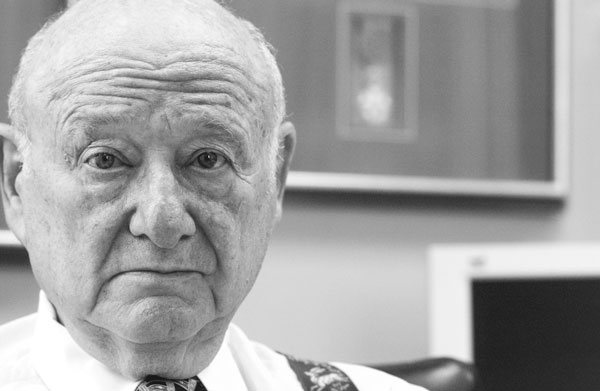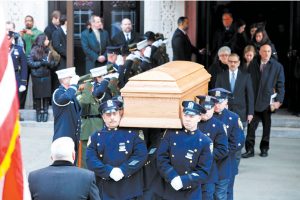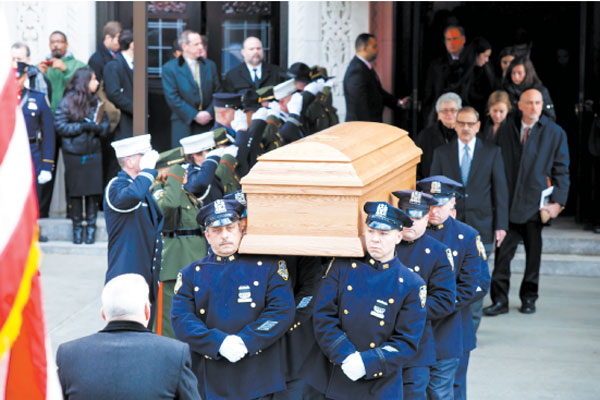
BY ALBERT AMATEAU | Edward I. Koch, three-term mayor of New York City who began his political career in Greenwich Village and defeated Tammany chief Carmine DeSapio 50 years ago, died Feb. 1 at the age of 88.

In and out of the hospital over the past few months, he died of pneumonia on the day that “Koch,” a documentary film by Neil Barsky, opened in the Village.
Outspoken and brash, Ed Koch guided the city as mayor from 1978 to 1989 as it emerged from the depths of fiscal insolvency, a homelessness crisis and a crippling transit strike. He was by turns a pragmatic and combative politician whose philosophy shifted by the time he became mayor from progressive to what many of his old Reform Democratic colleagues viewed as right of center.
His third term as mayor was marred by scandals that ended in disgrace and jail for several politicos with whom Koch had been friendly, although the mayor was not tainted personally.
Nevertheless, the Koch legacy includes municipal financial stability, a $5 billion middle- and low-income housing program and reform in the selection of judicial candidates. He was also an important supporter of the state-sponsored 42nd St. Development Project.
“As he did for a generation that grew up in a very different city than the one in which we live today, he inspired me to pursue a career of service to our the city,” said Muzzy Rosenblatt, director of the Bowery Residents’ Committee (BRC) — a nonprofit housing agency based in Chelsea — and former acting commissioner of the city Department of Homeless Services. “At the BRC gala in 2012, he spoke with passion about his administration’s achievement of the largest affordable housing program of any city in the nation and of our duty to reach out to people in need and provide them with care. Because Ed Koch, our best champion, left this legacy to our city, he will always be with us,” Rosenblatt said.
Manhattan District Attorney Cyrus Vance said in a statement, “New York would not be one of the safest big cities in America if Ed Koch had not spearheaded one of the most important criminal justice reforms in the city’s history: the selection of Criminal Court judges based on merit instead of political connections,” Vance said, citing Koch as having had foresight, vision and courage.
As mayor, Koch extended the Manhattan Reform policy of establishing screening panels to pass on judicial appointments citywide.
His outsized personality and zealous focus on his political career and on his image kept him in the public eye long after his defeat for a fourth term as mayor in 1989.
In 2008, after a couple of hospital stays, Koch bought a burial plot in Trinity Cemetery on 155th St. and Broadway for $20,000. He erected a marble headstone that proclaimed his Jewish faith with an English translation of a Hebrew prayer. The headstone goes on to say Koch fiercely loved the city of New York, its people and, above all, fiercely loved his country and served in its armed forces in World War II.
Born in the Bronx and raised in Newark, N.J., Ed Koch earned a law degree at New York University in the Village, where he campaigned for Adlai Stevenson for president in 1952 from a soapbox in Sheridan Square, according to Andrew Berman, director of the Greenwich Village Society for Historic Preservation.
A resident of the Village since the 1950s, first at 81 Bedford St., then 72 Barrow St., then 14 Washington Place and finally 2 Fifth Ave after he left office, Koch was one of the founders of Village Independent Democrats (V.I.D.).
A Reform club that included former members of the Stevenson campaign, V.I.D. was part of a movement to defeat Tammany, partly because the old guard did not go all out for Stevenson against the war hero, Dwight Eisenhower, who was elected president.
By 1961 when Koch was V.I.D. vice president and Village demographics were changing, Carol Greitzer, who later became a city councilmember, and James Lanigan won the co-district leader race against DeSapio and his running mate. But the Tammany chief ran again for male district leader in 1963. Koch, who always said he became the Reform candidate because no one else wanted the task, beat DeSapio by a scant 41 votes. He won again with more comfortable margins in 1964 and 1965.
“We saw him evolve into the political personality that everyone knows,” Greitzer told a reporter for this paper last week. “He was a strong speaker for Stevenson and other candidates but he was a terrible campaigner for himself,” she said of Koch’s early races.
In 1962 he ran in the Democratic primary against state Assemblymember William Passannante and positioned himself to the left of the incumbent by promising to liberalize state laws against sodomy, abortion and divorce. Koch lost, taking only 38 percent of the vote.
“He said himself that he ran a terrible campaign, but he became more confident the next year after he beat DeSapio,” Greitzer said.
In 1967 Koch ran for City Council from the Silk Stocking District, which then included the Village as well as the Upper East Side. He won, campaigning in person at subway stations, issuing newsletters and answering every piece of constituent mail. The same kind of campaign in 1969 won him the congressional district seat.
The city’s finances tumbled and its infrastructure crumbled in the 1970s, and Koch ran for mayor in 1977 as a centrist candidate who would stand up to municipal employee unions and make the city whole. He won, and won twice more, but in 1989 lost the primary to David Dinkins. In 1982, when Koch ran for governor, his own V.I.D. club refused to endorse him against Mario Cuomo and Koch joined the V.I.D. offshoot Village Reform Democratic Club, but he fell out later with that club, too.
Tony Hoffman, current V.I.D. president and a former Village district leader, recalled the club’s split with Koch as the mayor became more politically conservative.
“It’s understandable that a progressive Village club would have a different take on things from the mayor of the city, but Koch didn’t understand that,” Hoffman said. “He didn’t like to be questioned. The differences escalated. We thought his closing of Sydenham Hospital in Harlem during his first term was racially insensitive. Koch later acknowledged that. We also supported the teachers’ union when he turned against it.
“I blame Ed for the bitter split,” Hoffman said. “He was mayor and should have gotten people together amicably. But that wouldn’t have been Ed Koch; he was pugnacious.”
Koch demanded loyalty from his friends and would break completely with old comrades who did or said things he didn’t like. One permanently broken Village friendship was with the late Ed Gold, a member of Community Board 2 and a journalist who frequently contributed articles to The Villager.
Sometimes, however, Koch remained cordial with old friends despite irreconcilable differences, like with the late Martin Berger, who succeeded Koch as district leader.
“By the time he invited us to a dinner event at Gracie Mansion, he knew we disagreed on a lot of issues but he didn’t consider us enemies,” said Keen Berger, Martin’s wife and currently the Village’s female district leader.
Betsy Haggerty, who worked in the Mayor’s Office of Single Room Occupancy (S.R.O.) Housing from 1980 to 1985 and at one point led the Family Hotel Inspection Unit, recalled the complex relationship between Koch and housing advocates.
“We were dealing with families living in crowded apartments under terrible conditions,” Haggerty said. “We saw our jobs as defending S.R.O. tenants, families living in welfare hotels, and educating the mayor about how things were. The policy was that we could tell the administration anything and disagree with the city’s responses. They didn’t always do what we wanted but they listened. They expected us to push and we did, often pushing further than they liked,” Haggerty said.
Koch never married, and his sexuality was an issue in his 1982 try for governor. One poster in that campaign said, “Vote for Cuomo, not the Homo,” but Andrew Cuomo, who was running the campaign for his father, denied being responsible for it. Koch said often that it was nobody’s business, but he told a reporter in 1989 that he was heterosexual.
Nevertheless, when Gay and Lesbian Independent Democrats (GLID) criticized him for what they said was the city’s weak response to the AIDS epidemic, pro-Koch gays organized the Stonewall Democratic Club.
Koch, who often crossed party lines to endorse candidates, became friendly in recent years with the black activist Reverend Al Sharpton, who used to picket the mayor’s Washington Place apartment. A civil rights marcher in Mississippi in the 1960s, Koch as mayor had lost favor with black leaders.
Congressmember Jerry Nadler called Koch the “quintessential New Yorker.” Nadler said in a statement that he was proud to have been at Koch’s side “…on so many issues affecting the city and the state of Israel, of which he was an unflinching supporter.”
“He was irrepressible,” said George Arzt, a public relations executive who had covered City Hall for the New York Post, served as the mayor’s press secretary during Koch’s third term, and remained a friend. “His leadership qualities were often underestimated,” Arzt said, adding, “He always wanted to do the right thing and he raised the bar for public service.”
































